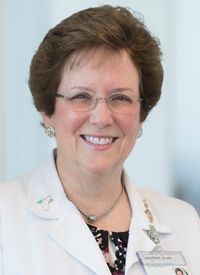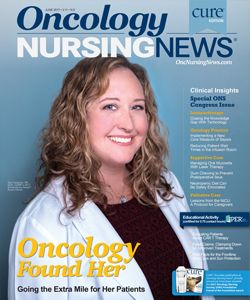School of Nursing Oncology to Offer Comprehensive Update on New Treatments in One Meeting
In August, Physician's Education Resource®, LLC will be sponsoring the 1st Annual School of Nursing OncologyTM (SONO) where nurses can earn 10.25 Contact Hours.
Laura S. Wood, RN, MSN, OCN

Laura S. Wood, RN, MSN, OCN
Oncology nurses have a unique opportunity to attend “summer school” in August, earn 10.25 Contact Hours, and learn the latest information about new treatments and side effects across the full range of tumor types from nationally recognized experts at the 1st Annual School of Nursing Oncology
TM
(SONO).
The SONO conference, to be held August 5 to 6, 2017, in Nashville, Tennessee, is a CME/ CE-certified activity sponsored by Physicians’ Education Resource®, LLC (PER®).
In an interview with Oncology Nursing News SONO program co-chair Laura S. Wood, RN, MSN, OCN, explained that one of the attractions of this meeting for the practicing oncology nurse is its broad coverage of cancer and treatment options. “So much is changing for our patients and for ourselves as clinicians—the meeting offers a great opportunity to get a comprehensive update.”
“The treatment options and the diagnosis and management of cancer from early to advanced disease and survivorship is constantly evolving,” continued Wood, who is the renal cancer research coordinator at Cleveland Clinic Taussig Cancer Institute. She added that it’s especially helpful that the conference will cover all of the solid tumor malignancies as well as hematologic cancers, in one, 2-day conference.
At the conference, Wood will be giving 2 presentations, 1 focused on genitourinary cancers, where she said the biggest change has been in bladder cancer where patients have many more treatment options than they did even 1 year ago.
Immunotherapies have expanded rapidly in the clinic, following on recent FDA approvals across many tumor types; thus, not surprisingly, information to help nurses educate and manage patients on these therapies will be a focus of the SONO meeting that will include a session dedicated to clinical applications in the management of toxicities associated with immunotherapy.
Nurses are very good at managing chemotherapy and educating patients and families on chemotherapy and chemotherapy-related side effects,” said Wood.
“Immunotherapies represent a paradigm shift, and we have found in our clinical practice, that how patients with a given disease tolerate a therapy varies.” Wood stressed that for patients to stay on these therapies, communication with their healthcare team is crucial.
“Patients need to know what to watch for, and they need to clearly understand the importance of early and ongoing communication. That goes for the patient and the healthcare team.”
In her presentation, program co-chair Grace Cherry, RN, MSN, NP, will focus on melanoma, the setting where immunotherapies were first deployed. Cherry, an oncology nurse practitioner with the UCLA Melanoma Program, will focus on the mechanism of action with melanoma therapies, as well as melanoma staging.
“It’s an opportunity to show how melanoma is an immunogenic tumor,” Cherry said, adding that with immunotherapies being seen more and more in practice, helping nurses understand the agents’ significant clinical experience thus far in the melanoma setting can be very useful to the oncology nurse in the clinic.
Wood is also giving a presentation on best practices for communicating with patients about adhering to their treatment regimens. Although adherence to oral oncolytics garners a lot of attention, she will also stress the importance of patients adhering to their supportive therapies. She explained that if patients don’t understand the importance of following guidance on antidiarrheal regimens or steroids, for example, “they’re going to experience side effects that will interfere with their treatment, their quality of life, and their overall wellness.”
“If the healthcare provider isn’t well-versed on tracking that and questioning that, they’re going to miss an important piece of the overall management of that patient...Are patients taking the right dose, the right formulation, at the right time?”
Such careful monitoring and communication certainly applies to one of the more prevalent side effects that patients experience—chemotherapy-induced nausea and vomiting (CINV).
This will be the focus of a presentation by program co-chair Beth Eaby-Sandy, MSN, CRNP, OCN, thoracic oncology nurse practitioner at the Abramson Cancer Center at the Hospital of the University of Pennsylvania.
“CINV is probably the most rapidly changed supportive care topic in oncology in the past 2 years,” said Eaby-Sandy. “Several new drugs have been approved with new routes of administration with a longer half-life.
For More Information
To learn more about the 1st Annual School of Nursing OncologyTM, view the agenda, and to register, visit gotoper.com. The meeting will be held at the Loews Vanderbilt Hotel in Nashville. Physicians’ Education Resource®, LLC is approved by the California Board of Registered Nursing, Provider #16669 for 10.25 Contact Hours. Program content is reviewed by the Oncology Nursing Certification Corporation (ONCC) and is acceptable for recertification points.
“The most important thing for oncology nurses is knowing which drugs cause what level of CINV and also, the newer treatment options and how to individually tailor antiemesis prophylaxis to each patient.”
Eaby-Sandy also will be presenting on side effect management in another growing class of cancer drugs: targeted agents for lung cancer. She plans to review both the MASCC and NCCN guidelines for managing toxicities associated with these agents, in particular, rash, along with some of the less common but concerning ones.
The SONO conference will have an interactive component, Cherry noted, adding that she is really looking forward to collaborating with other practitioners at the meeting:
“Our goal is to provide practical and meaningful information nurses can immediately deploy back home in their clinics...We hope nurses will leave here more confident in their interactions with patients and family members."

Innovative Program Reduces Nurse Turnover and Fosters Development
Published: September 12th 2024 | Updated: September 12th 2024The US Oncology Network (The Network) has developed one of the most comprehensive programs in the nation to support the professional development and retention of new oncology nurses.


